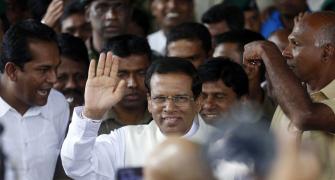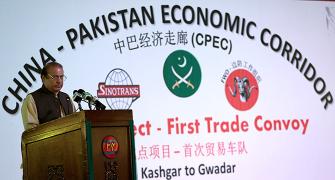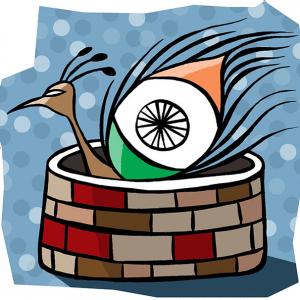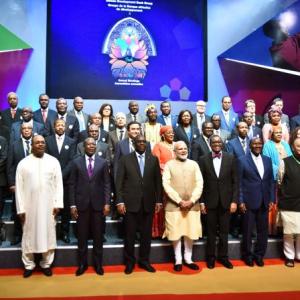'China held a meeting on the One Belt One Road and India boycotted it.'
'However, all of India's neighbours attended, except for one, Bhutan.'
'India warned those attending that the partnership with the Chinese would come at a heavy price, but almost nobody heard us.'
'The question is: Why not?' asks Aakar Patel.
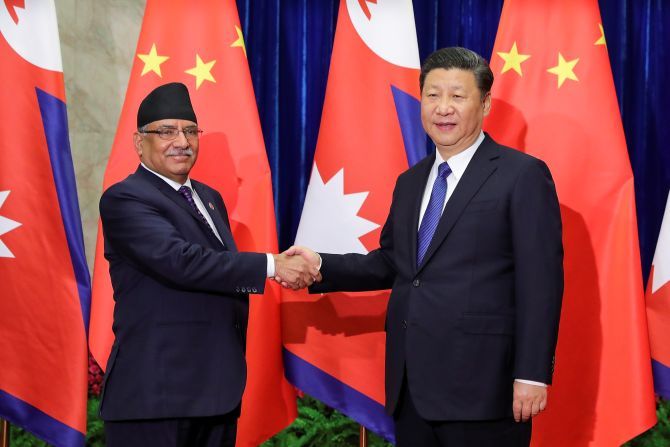
A little under 30 years ago, after Vishwanath Pratap Singh became prime minister, he met with Sri Lanka's then president Ranasinghe Premadasa.
Singh, a polite man, says he was surprised when the first thing Premadasa said to him was: 'When are you taking your army back?'
The reference was to the Indian Peace Keeping Force, a group of soldiers from the Indian Army sent to Lanka to fight the Tamil Tigers.
India had deployed tens of thousands of its jawans (over 1,000 of whom would die fighting the Tamilians) and we had thought of it as a sacrifice for the Lankans.
However, the Lankans, according to Singh, saw it as interference after a point and wanted the Indians out of their country.
The civil war in Lanka ended with a victory of the Sinhalese nationalists, and today Lanka is no longer in India's influence as it was 30 years ago.
If there is a nation that many Lankans see as interfering, it is China.
The giant ports bring developed by the Chinese in Colombo and Hambanthota are projects of a scale India cannot compete with.
However, they come with a compromise, which the China model of development brings with it. There is no time here for details, but to some extent it means more or less like having Chinese colonies on your land.
And to a larger extent, it means having to take on debt from the Chinese that you may or may not be able to afford.
The Chinese are executing today the most important and largest infrastructure project of the world. It is called One Belt One Road.
The belt is a series of highways and the 'road' is a network of ports and sea routes.
China held a meeting in May to show its vision and India boycotted it. However, all of India's neighbours attended, except for one, Bhutan.
Sri Lanka, Myanmar, Bangladesh, the Maldives and Nepal all attended, leading to fears of encirclement in the community that thinks about strategic affairs in India.
India warned those attending that the partnership with the Chinese would come at a heavy price, but almost nobody heard us. The question is: Why not?
The answer, to return to the original point of this article, is that almost all of India's neighbours either dislike or suspect us.
Even in Hindu Nepal, Indians are not particularly popular.
We have no neighbour with whom we have a relationship like the United States has with Canada. All our borders seem to be like the US and Mexico's, or worse.
Perhaps the fault is entirely that of our neighbours'. Certainly the average Indian holds the impression that we are victims of other nations' mischief.
This is coupled with the prejudiced view many of us have of our neighbours. We believe Bangladeshis are illegal immigrants, Nepalis are watchmen and Pakistanis are terrorists.
Anti-India riots broke out in Nepal a few years ago in which people were killed and property was damaged.
This came after a report alleged that actor Hrithik Roshan said he hated Nepalis. Roshan had said no such thing, and the report was false, but the thing to ask is: Why did the Nepalis believe it immediately?
Today Nepalis in the northern part of the country think India is playing games by dividing their country into hill-people and plains-people and instigating a long and painful blockade against the former (who are the elite).
They also think India is interfering with their constitutional processes.
It is possible that India has legitimate concerns and interests in Nepal. However, we must ask ourselves why our relations with a Hindu country are in such tatters that we could not get them to side with us against the Chinese.
Even with Bhutan, our only 'friend' against the Chinese, our relationship is not one of equals.
Under Nehru, India imposed on Bhutan something called a Friendship Treaty, which actually was nothing of the sort. The treaty gave India a veto on Bhutan's foreign policy.
The exact words are 'the Government of Bhutan agrees to be guided by the advice of the Government of India in regard to its external relations.'
This was removed only a few years ago, I think under Vajpayee.
Nehru inherited an aggressively expansionist imperial State which had tentative borders. Neighbouring States feared the India of the British Raj, and legitimately.
Our failure has been that we have not been able to overcome that fear and distrust and build relationships that are meaningful and based on respect and mutual interest.
That failure showed in our isolation at the belt and road summit.
India will not be able to match for a long time China's economic influence on our neighbours. But that does not stop us from being real friends with them.
Aakar Patel is Executive Director, Amnesty International India. The views expressed here are his own.
- You can read Aakar's earlier columns here.
IMAGE: Chinese President Xi Jinping, right, with Nepalese Prime Minister Pushpa Kamal Dahal 'Prachanda' in Beijing, March 2017. Photograph: Lintao Zhang/Reuters

